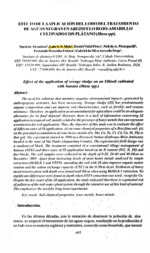Efecto de la aplicación del lodo del tratamiento de aguas negras en Argisuelo Rojo-Amarillo cultivado con plátano (Musa spp).
Efecto de la aplicación del lodo del tratamiento de aguas negras en Argisuelo Rojo-Amarillo cultivado con plátano (Musa spp).
Author(s): ALCANTARA, S. de; MELO, L. A. da S.; PEREZ, D. V.; MENEGUELLI, N. do A.; FEITOSA, F. P.; JORGE, G. da S. A.
Summary: The need for solutions that minimize negative environmental impacts, generated by anthropogenic activities, has been increasing. Sewage sludge (SS) has predominantly organic composition and can improve soil characteristics, such as fertility and erosion resistance. Therefore, its application as an amendment for agriculture could be an adequate alternative for its final disposal. However, there is a lack of information concerning SS application in tropical soil, mainly related to the presence of heavy metals that can represent a restriction for soil application. Thus, the objective of this study was to evaluate the effect of different rates of SS application: (i) on some chemical properties of a Brazilian soil (ii) on the potential accumulation of some heavy metals (Fe, Mn, Cu, Zn, Cr, Cd, Co, Ni, Pb) in that soil. The experiment started in 2000 in a Research Station (Embrapa-Meio Ambiente) located in the state of São Paulo (Jaguariúna County). The experimental field design was a randomized block. The treatment consisted of a conventional tillage management of banana (NPK) and three rates of SS applications based on its N content (N/2, N, 2N) and five blocks. The soil samples were collected in the depth of 0-20, 20-40 and 40-60cm on November 2005. Apart from increasing levels of most heavy metals analyzed by simple extraction (Mehlich 1 and DTPA), amending the soil with SS also improve organic matter content and the cation exchange capacity (CEC) in the 0-20cm layer. Evidences of heavy metal translocation with depth were found until 60cm when using Mehlich 1 extraction. No significant differences were found in depth when DTPA extraaction was used, except for Cu. Despite the few years of the SS applications, the study indicated that there is a potential risk of pollution of the soil-water-plant system through the intensive use of this kind of material. This emphasizes the need fot long-term experiments.
Publication year: 2006
Types of publication: Paper in annals and proceedings
Unit: Embrapa Environment
Keywords: Heavy metals, Soil chemical properties, Trace elements
Observation
Some of Embrapa's publications are published as ePub files. To read them, use or download one of the following free software options to your computer or mobile device. Android: Google Play Books; IOS: iBooks; Windows and Linux: Calibre.
Access other publications
Access the Agricultural Research Database (BDPA) to consult Embrapa's full library collection and records.
Visit Embrapa Bookstore to purchase books and other publications sold by Embrapa.

